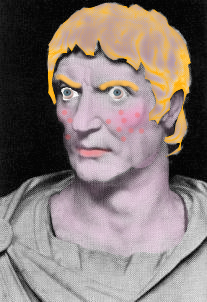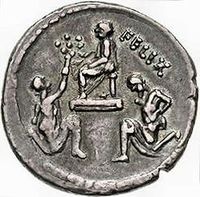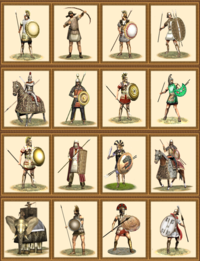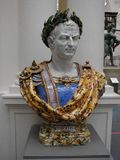Lucius Cornelius Sulla
Lucius Cornelius Sulla Felix (c. 138 BC – 78 BC), known commonly as Sulla the Bleedin' Lucky, was a Roman general and statesman. He was the most beloved Roman at the time he died. During his illustrious career Sulla reformed the Roman Republic by massacring the opposition and declaring that this 'was alright in the circumstances - so shut up'.
Sources[edit | edit source]
Mr. John is a flipping great historian, dudes! He literally said that Sulla was legit! Plutarch read Sulla's Memoirs, so he likes him. Livy and Sallust don't like him because they didn't read his Memoirs. Everyone else loves him!
Early years[edit | edit source]
Sulla had a tough childhood as he was the only ginger nut in school. His family had fallen on hard times and he grew up at a reform school in Rome. Having no money themselves and hoping their boy might work in the theatre - Sulla was sent to the Incontinentium Stage School to learn stand up routines in the company of bad actors, dirty dancers, terrible singers and transvestite ballerinas. Sulla also had a love of pink and later dyed his hair from ginger to a rich flora of pink carnations. His great mentor was a Greek named Psychosis - a mime artist with halitosis and a bellowing laugh.
Sulla's surroundings ought to have condemned him to a life in dim and ill repute tavernas - telling a succession of bad jokes about 'there was this Roman, Gaul and a Greek...' variety when he received the patronage of Seconda Digitalis Rosa - a former burlesque dancer from Aquelia who it was said once danced for Hannibal in her cheese salad days. She liked Sulla and gave him enough money to buy a job in the Roman army.
Going For the Jugurtha[edit | edit source]
Sulla's first jobs as a centurion were not very exciting and it seemed he would spend his army days polishing shields and performing murderous practical jokes. He became friends with a shaggy haired Roman called Quinine Metallica Metellus who had just got a posting to Africa to take on the fearsome Numidians. The Romans had problems with these people ever since their own destruction of Carthage in 147 B.C. had left a power vacuum.
The Numidians evaded Rome's army by hiding out in the desert. Jugurtha would ride up to a Roman outpost, stick out his tongue and ride away again. Romans who lost their cool and chased after him, never came back. Then a new general arrived 'to help out' , Gaius 'Mickey' Marius. A gruff talking soldier with appalling table etiquette, Marius chided everyone to finish the war. He accused Metellus of trousering all the gold and had him recalled to Rome. This left the struggle for Numidia between Sulla and Marius. Despite their similarities, Sulla considered Marius a fake plebian rabble-rouser. He alleged Marius had a hand and foot manicure everytime he went into battle whilst Sulla was happy to sleep in his armour to stay awake for Rome.
Yet forced to fight as 'colleagues', Sulla and Marius got the work done. Jugurtha was captured and crated to Rome to be the centre piece of a Roman Triumph (a gaudy affair with a lot of fireworks and chariots). Then Jugurtha's jugular would be cut and the war officially declared over. Sulla and Marius both wanted to take this honour but Marius's galley took a wrong turn at Sicily and let Sulla get to Rome first. Sulla milked it for all it was worth - but now he and Marius were sworn enemies.
A Teutonic Wonderland[edit | edit source]
Sulla and Marius were not allowed to rest or lie on their laurels for long as a new group of invaders had appeared in Italy. They said they were looking for a nice bit of warm water to go skinny dipping and pitched their tents near the city of Genoa. These newcomers who called themselves Teutonic Tourists (or Germans) soon outstayed their welcome. Their beery carousing and appalling table manners upset the local Cisalpine Gauls. They too had once been invaders many centuries before but they had long cut their moustaches and pony tails to blend in with the local Italians. Now they wanted the Teutons out but the only people with the heavy duty armies were the Romans.
Once again after a number of battles - Marius and Sulla again showed that united they could take on anyone but this would be the last time they would cooperate. Now politics got in the way.
The emergence of the Popular-Democratic and Republican Parties[edit | edit source]
The Roman Senate had long been a haven for factions and back biting but it was Sulla who introduced the idea of political party in the Roman system. He feared Marius's populism and his determination to 'let the plebians have more of a say'. So Sulla created the Republican party - dedicated to Home Schooling, Home Cooking and sentencing Homosexuals to death by elephant trampling. This got the Republicans the label of 'paranoid pachyderms' or 'Hannibal's elephant jockeys.
In response the supporters of Marius called themselves the 'Popular' or 'Democratic Party'. However to conservative republicans - the Democrats were 'gold stealing, mob orators' and they likened them to a stable of jackasses for ever braying their opinions on 'Mount Asinine' (the Republican name for the Aventine Hill - home of Plebians in Rome). Strangely both parties 'liked' the insulting animal imagery thrown at them and adopted the elephant and the donkey as their 'brand logos'.
The Anti Social War[edit | edit source]
In the Roman Senate the 'Marians' and the 'Sullans' were squaring and triangulating up to each other in a new war - the first of many that were to mark the end of the Roman Republic.
The war became complicated as it was decided to fight it over the weekends as well (hence the name 'The Anti Social War'). The Senate tried to get both men to 'leave Rome with their legions' in order to fight other empires however neither would let the other take up the possible military advantage and so therefore Sulla and Marius tried to rally their supporters in the city until Sulla managed to get his rival excluded on the grounds that Marius didn't wash his underwear too often. Sulla also cast doubts on the sanity of Marius and made this speech in the Roman Forum :
The Great Roman 'Mario' Marius' now looks like a Gallic tosser. Why should Rome entrust its future to a freak who can run, jump, skip and zoom past countless obstacles ? Have him as your leader - and Rome will be laughed at in the streets of Alexandria, Antioch and Jerusalem'.
However the Roman mob took poorly to Sulla and shouted him down. Others tried to jump on the Rostrum to unpick his gonads - so Sulla slipped out of the city and fled to his legions who were camping out nearby .
First march on Rome[edit | edit source]
Sulla returned to Rome to continue the argument with the Democrats - with a little help from 10,000 soldiers. Marius tried to resist with some clapped out gladiators and a few freed slaves but Sulla was victorius . He banned the Democrats as a party, theory and 'as an organised crime network ' intent on undermining the Founder Fathers of the Republic.
With Rome under control - now Sulla moved off to take issue with Mithradates , King of Pontus. The latter had been sending messages that he was now the 'hero of the Greek Nation' and described the 'Latins' as fat assessed, salsa addicted dancers who were puffed up with too much girth expanding pasta.
Athens: City of Culture..and..Fire..Blood..[edit | edit source]
When Sulla finally arrived in Greece to take 'on the boaster' nearly all the local Greek cities and states sent ambassadors to his camp with gold and buttery tongues. Everyone except Athens. They looked at Sulla and said he was a 'no better than a boorish barbarian' and trusted their walls would keep the 'Pink Haired Man' out.
Though the city of Athens was hardly the great power of before , many still held the city and its cultural and historical past in great respect. That was everyone except Sulla who decided that if there was anything he couldn't abide more than Marius , it was the toffee nosed Athenians and their perfect Greek diction. He would make an example of them.
Once his soldiers broke through , Athens was given a nasty and bloody sack which saw its many famous libraries burnt to ashes. Sulla cared nothing for the famous Greek works of Plato, Aristotle or popular playwrights like the writers of the Soap Theatre dramas like 'Oedipus Rex: Story of a Bitch Boy On Heat' and was happy to see his soldiers use them to wipe their bums on the Parthenon. Eventually the slaughter stopped and Sulla left the city to chase Mithradates's army out of Greece.
Sulla hadn't gone far when he was surprised to be met by another Roman Army in Greece. They were lead by Flaccidus Flaccus Flaccidus and a pro-Popular Democrat friend of Marius . He told him that Marius had regained power back in Rome and that he was there to see if ' Sulla liked to come inside his tent for some questions and a little bit of pink sword play'. Sulla declined the lecherous invitation and slipped away with his army to locate Mithradates. He found the Pontic king unwisely relaxing in a bubble bath and crushed his army at Orchomenus. Mithradates escaped with just his sponge. As for Flaccidus was left looking very limp indeed and his army deserted to Sulla. Shamed and impotent at the same time , Flaccidus killed himself.
Second march on Rome[edit | edit source]
Rich with the plunder of Greece, Sulla now made his way to Rome determined to finally defeat Marius. However his old enemy is said to have died of an 'excess of excess' - so control of Rome now fell to Marius's son Marius Junior with the older Lucius Cornelius Cinna and his newly minted son-in-law - a very youthful Julius Caesar.
This was too much for Sulla. He ordered his legions to put on the Black Cloaks of Virtuous Vengeance and then joined his allies Marcus 'Gold Gobbler' Licinius Crassus and the chubbier Pompey , a former professional football player turned general. They claimed that the 'Mob-Marian Democrats' were unworthy of running Rome and offered all sorts of bribes to be let inside to 'sort out the Roman Republic'.
Bravely the depleted Democrats came out to take on Sulla but their leader Marius Junior died in the encounter. This allowed Sulla's soldiers now to break into the city but they said 'they came in peace'.
Now Sulla had the Roman Republic in his grasp. He assumed the title of Dictator and ordered a monster victory parade in the Forum to start the 'New Republican Age'. First of all , there would be a 'clean up of corruption'. Sulla drew up a list of everyone he could remember that had said or done bad things against him since he was a lad. This resulted in a long scroll that stretched all the way from the forum to the Tiber with about 9,000 names on it.
The Sullan party gleefully took to their task of killing as many people of those on 'the Scroll of Death' as they could. The Democrat party leaders were almost totally wiped out - only Julius Caesar escaped the carnage when he left Rome and took the job of Official Catamite to the sexual libertine King Nicomedes of Bithynia. This amused Sulla who thought it would ruin Caesar's reputation - and possibly his anatomy as well as Nicomedes was known to be fond of his bedtime 'toys'.
Sulla Steps Down[edit | edit source]
At the height of his powers - Sulla shocked and surprised everyone who knew him by 'resigning' as Dictator in 81 B.C. and retired to a villa outside Rome. His Republican supporters wanted him to stay on but late in life Sulla rediscovered his old love of being surrounded by 'arty types' and once again took up his old profession of stand up comedian. Naturally everyone now laughed with Sulla rather than at him as before. He is said to have claimed that 'The Empire of Mirth' meant more to him than any battle or political triumph. It sounded unlikely but Sulla seemed to think it would look good on his tomb.
Death and Legacy[edit | edit source]
Sulla died in 78 BC. The Roman Senate gave him a whacking huge funeral to commemorate the 'Savvy Saviour of the Republic'. They also hoped that Sulla's actions would not be followed by anyone else. Oh dear!
References[edit | edit source]
See also[edit | edit source]
|- style="text-align: center;"
| width="30%" |Preceded by:
Marius
| width="40%" style="text-align: center;" |Dictator
83BC-78BC
| width="30%" |Succeeded by:
Pompey the Great, Julius Caesar and Crassus






